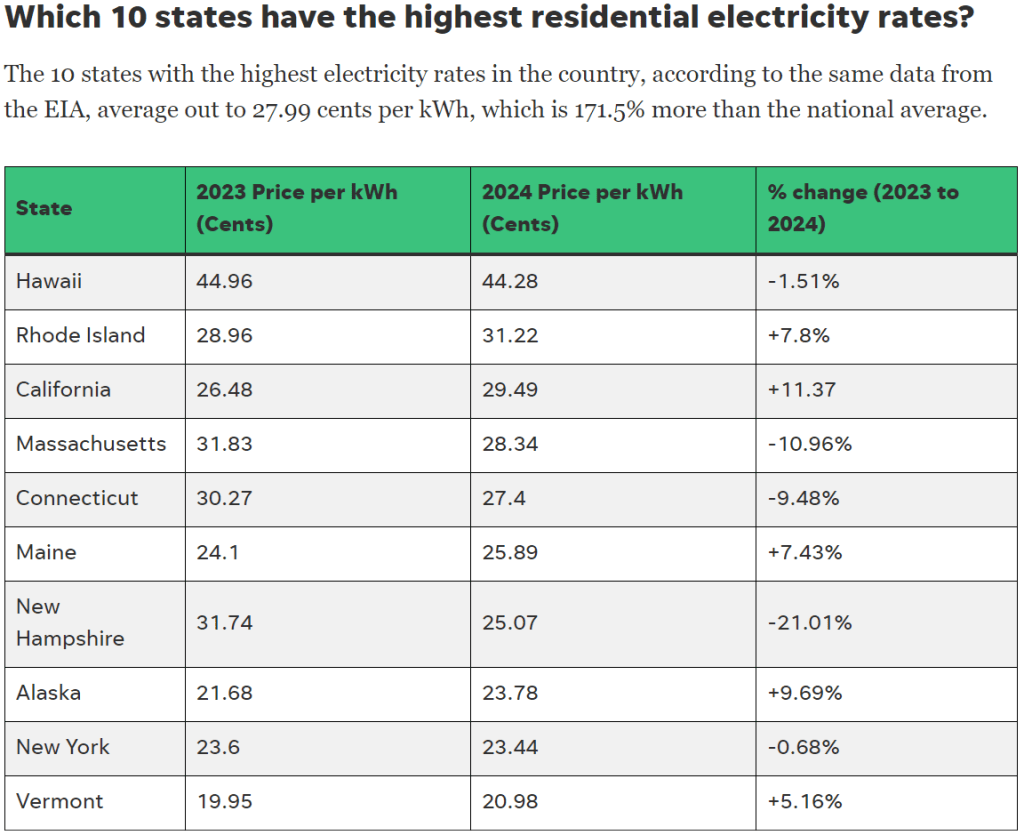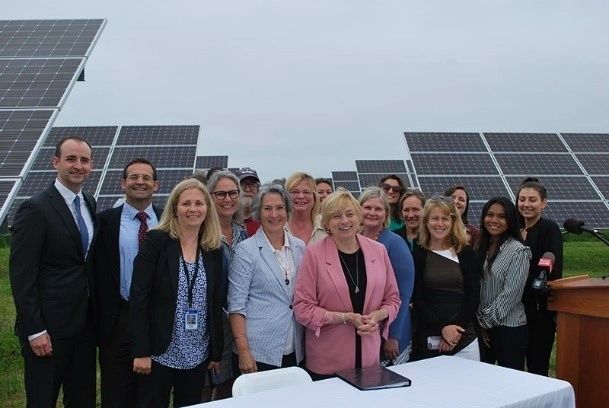Maine, moving from bad towards worst 2024
About a year ago The Maine Anchor published an interview with Jim LaBrecque who gave a history of why Maine has such high electric rates. The question is, did the 131st, Democratically controlled legislature do anything for the people of Maine, or did they represent special interest groups with their hand in your pocket?
It has been another bad year for electrical users in Maine. Scores of good, bad, and ugly bills were introduced which could have helped or hurt the consumer. Good bills include, a Republican Bill, LD 683, An Act to Reduce Energy Bills to end net energy billing and significantly reduce energy costs (failed), another Republican bill, LD 43 which would remove the 100-Megawatt cap on renewable energy and reduce rates by allowing use of low-cost Canadian hydro to meet our renewable energy goals (another fail). Lastly is the ugliest, a flagship bill, which, if fully implemented, will cost the Maine consumer many millions of dollars. Bill LD 923 would build a 345 KV 1200-Megawatt transmission line in support of planned massive renewable installations (passed). With no limits on new projects and huge profits guaranteed to the owners at several times the spot market price, it is a “license to steal” from the Maine consumer who is left with the bill.
A May USA Today article notes that Maine has the sixth highest electrical cost at 25.89 cents per KWH. This is 60% higher than the average state and over twice the cost of 14 other states. A recent article in The Maine Wire notes that, “on average, Maine residents spend about $241 per month on electricity. That adds up to $2,892 per year.” The 132nd legislature will again have a chance to fix this, however, if control does not shift to Republicans, we can expect things to get worse – possibly a lot worse. Change is needed in Augusta.
Jim LeBreque’s original article follows.
Interview With Jim LaBrecque CMS
The Maine Anchor recently had the opportunity to interview and film Jim LaBrecque, a Carbon Mitigation Specialist (CMS) and a well-known Energy advisor. He is a man passionate in his beliefs of conservation and low energy costs. On behalf of the rate payers, he is willing to take on Maine’s Green Energy Industrial Complex and their elected accomplices The interview started with a tour of the Bangor facility and a close look at a miniaturized and efficient refrigeration unit which his company is building. A theme of Jim’s is conservation. A more efficient use of available energy sources such as heat pumps can reduce carbon, reduce electrical consumption, is immediately cost effective, and, important to him, does not shift the cost burden to the local consumer.
The topics were many, far ranging, and filled with facts somewhere between a mystery novel and a crime scene investigation (CSI). Many would look at our current energy costs as a train wreck and Jim is finding the culprits and naming names. The story starts in the 1990’s with CMP as a generator, transmitter, retailer and meter reader. Maine Yankee Atomic was quietly supplying 840 megawatts per hour at a cost of 2.5 cents per kilowatt, the PUC was paying attention, and this writer had an electric bill of $36 a month. Then, as Jim put it, the Legislature became interested in power and became actively engaged in managing the process. Jim has a spreadsheet of approximately 300 bills that have impacted consumer cost. He randomly clicked through the spreadsheet identifying small charges to the consumer that are funneled to various non-utility organizations, a few dollars here a few dollars there and they add up. In truth these are hidden taxes which CMP collects then send to favored industries. The state’s hands are clean, they never touch the money, CMP does not get a cut they simply pass it along. Bad bills, too many handouts, unreliable power, failed projects, and millions going to people that have nothing to do with production, transmitting or metering are driving up consumer costs.
There are scores of bad bills, but the trail leads to a handful of the worst. In 1997 the 118 Legislature passed bill LD 316, An Act to Restructure the State's Electric Industry. The ideal was by breaking up CMP and putting middlemen in the process power costs would go down. Unfortunately the increased competition that was to drive down prices never happened. On the contrary, sweetheart deals to favored producers, the transfer of money from the ratepayer to favored industries, and the unreliable mix of power on the grid has driven up costs. In 2019 the 129 Legislature passed LD-1711, An Act To Promote Solar Energy Projects and Distributed Generation Resources in Maine, and LD-91, An Act to Eliminate Gross Metering, both designed to enrich the Solar Industry at the expense of the ratepayer. The result is solar power that costs 4 times as much as other generators and a mad scramble as outside money comes to Maine to get their share of almost a billion dollars that will be paid for by Maine businesses and citizens.
Jim noted, if solar is used to replace the 1200-megawatt Central Maine Power Corridor (Quebec Hydro) it would take about 110 solar farms totaling 54,500 acres and containing 25 million solar panels. In around twenty years those solar panels will become 35,000 tractor trailer loads of waste. Presently there are 600 applications for solar projects in Maine. Each will add to the cost of electricity, require costly backup generation when they are not producing, will require new power lines connecting them to the grid, will make the grid less reliable, and ultimately, will need to be decommissioned.
Jim then gave a history lesson of decades of bad decisions for the ratepayer that now burdens Maine with very expensive electric power and reduced Central Maine Power to the role of bill collector for the failures. He then gave a list of where the money is going and who is profiting. The winners are Onshore Wind Developers, Solar Developers, Solar Owners, Electricity Providers, Wholesale Generators, Efficiency Maine, the Biomass Industry, Trash to Energy Industry, Offshore Wind, Tidal Power, and other costly programs paid for by our utility bills and forwarded to special interest groups. The loser list is much shorter, they are the residential user, Maine’s struggling businesses, and CMP who is being used as the scapegoat of rate increases. He then gave an example of legislation that increases costs. Bill LD 1711, Net Energy Billing, when fully implemented, will cost ratepayers $370 million per year and many billions over the lifetime of the program.
Using the cost to the consumer as a score card the Legislatures decades of involvement have been a dismal failure. The solution, according to Jim, is to take control of generation away from the politicians and let utility engineers and management unravel the patchwork of programs, failed projects, and bad decisions. Then, using good business planning, reduce electrical costs and reduce fossil fuel usage using a smart and green strategy.






0 Comments